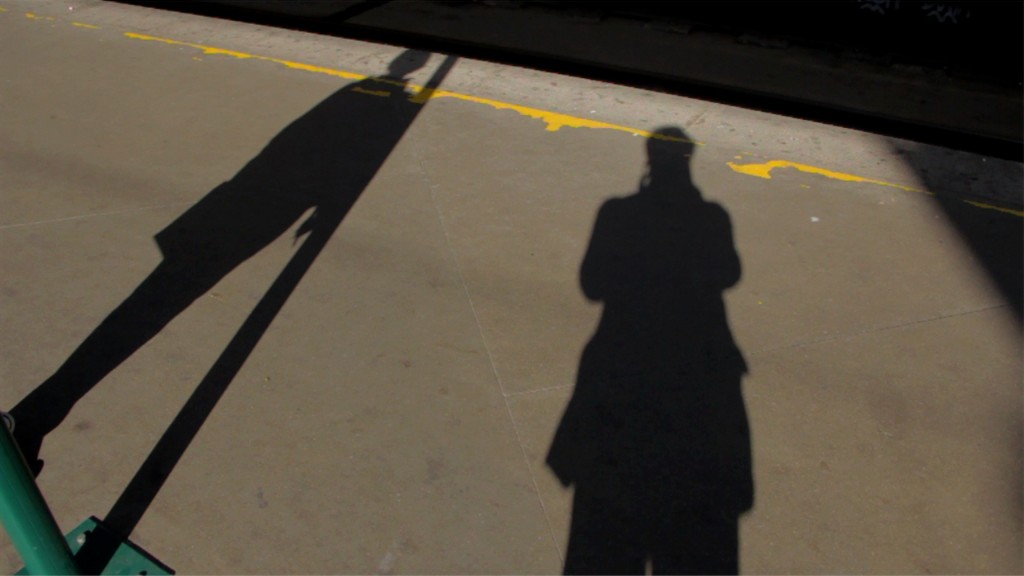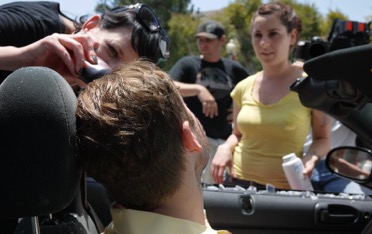The Featured Filmmaker Series gives you the chance to get to know CollabFeature filmmakers through a series of interviews that give an inside peek into the minds and lives of our collaborators.

How has your upbringing and surroundings in Greece manifested in your works; is there anything about Greek culture that you think is evident in your films?
As filmmakers, I feel we bring into our films something personal, something of who we are. In this sense, one could say my upbringing, being part of who I am as a person and artist coming from Greece is also part of my works. Perhaps in the themes I choose to follow, or in the questions I ask, or behind the decisions my characters take? I can’t really say. I don’t think though it is something dominant. I don’t believe one would watch any of my films and say, “she is Greek”. My stories could be taking place anywhere in the world.
 You have been working in many different posts behind the scenes -- if you weren't directing, which one role would be your choice?
You have been working in many different posts behind the scenes -- if you weren't directing, which one role would be your choice?
I love everything that has to do with cinema. If I weren’t to direct, I would choose to be involved in editing. The creativity can be limitless and you always discover a lot in the editing room, same as in a film set.
As part of Train Station, what possibly differentiates you from the other filmmakers on the roster? Conversely, what might you share with them?
I think in “Train Station”, everyone shares the same love and passion for filmmaking, for collaboration and creating something unique. And that uniqueness into our project is each filmmaker’s voice, and this is what differentiates us. And it can be seen in every segment of our film. Even though there are connections and continuity, each segment is different from the other. For me there is never any one way to view a story, and the best stories tend to be ones that teach us a bit of something, while also inspiring us to new thoughts. And I think “Train Station” does that, it inspires its viewers.

4) Regardless of short or long form narratives, what defines your work as a cinematic storyteller?
I think that is still a work in progress to be honest. From what I have done so far, I would say in my films my heroes face an ethical dilemma that challenges them and in a way “forces” them to walk out of their safe zone and take action. I prefer to let the action unfold for the viewer and get him a closer perspective in key moments of the story. But generally I think my cinematic language is still something in development. I have done 6 short films so far and I have learned a lot but I still want to try out so much more, play with different genres too. I think who we are as storytellers evolves and changes with every film.

5) On that note, tell us more about your latest short film, Wolves & Sheep, and the feature that you are developing.
“Wolves & Sheep” was created during the Shooting Lab workshop of the Generation Campus in Moscow in 2013. We were asked to create, shoot and edit a film following 'five obstructions': running time shouldn't exceed one minute, everything would be filmed in one location, there would be no dialogue, just music, the film would have three lead characters and no more than three characters would be in a shot.
It was a creative challenge and I learned a lot from the process. Working the script and getting it to the core of the story, collaborating with Russian actors who I met on the set, getting the story through in just one minute. It was great. I also met some amazing people from around the world and we had a great teacher Rafi Pitts, who was an inspiration to work with.
As for my feature film, it is entitled “Hypnos” and I am very excited about it. It’s a fantasy feature film that combines ancient Greek myths with orthodox prophecies. For me Greek mythology is an endless source of inspiration that oddly enough has not been harvested yet. “Hypnos” is inspired by this literature and attempts to fuse it with key religious elements from the orthodox books and mould it into science fiction. I am collaborating with a very talented scriptwriter on this, Alexandra Dyranis-Maounis, and it is a very creative process.

6) Your filmography, as exemplified by Behind the Veil and In Transit, which are respectively on the subject of discrimination/prejudice and immigration, suggests that you are concerned with themes of human rights and tolerance. Since Greece is in the midst of the migrant/refugee crisis, what are your views on this issue and would you tell a story about it?
It is heartbreaking for me to witness the current refugee crisis. All those people, children, losing their lives in the Aegean Sea. I read recently there are more displaced people and refugees now than at any other time in recorded history and in numbers not seen since World War II. It saddens me to see history repeating itself. Greece is trying to deal with the situation, but there are many problems in many levels. Add to those the financial crisis my country has been facing the past 5 years, things are quit hard. It is hopeful how the local communities have been helping out along with NGOs and volunteers. Greeks have a long history of being refugees themselves so I think they can relate to all those people looking for a better future in Europe. But this is something that asks for actions on a larger scale. I don’t know though how much there is the will for such actions. Throughout Europe, xenophobia and racism grow rapidly, and nationalist, even far-right parties are gaining ground. At the same time, this is only the beginning of the crisis, because the conditions inciting people to flee their homelands will only worsen. I do hope that as the world changes, Europe can change with it and that sensible proposals will come forward. Films can help people overcome their fears and xenophobia, and thoughts are there for a film.
7) As a participant in an international venture like CollabFeature and having worked across various countries in Europe, do you consider yourself on track to become a "transnational/world cinema" filmmaker?
 I never thought of it this way before to be honest but I guess you are right. I feel getting to travel, live, and work in a different country, can influence you in many ways and is an experience one should pursue. It gives you a connection with other cultures, engages you in conversations that lead to greater understanding and better appreciation of the people. It shows us how we are similar and different and learn from those characteristics. Through traveling, we’re savoring experiences, which we can then apply to our art. At least for me it is like that. And it has been helpful on a practical level too. It gave me a chance to build my skills, learn how to work with people from different cultural backgrounds and opened up new horizons and different ways to deal with things, which then I could apply in my country. For example being in Canada and volunteering for the TIFF festival was a real eye-opener for me in event management. So yes, I do feel that I have been influenced from my experiences abroad as a person and filmmaker and I do consider my self on track to become a “transnational/world storyteller”. ☺
I never thought of it this way before to be honest but I guess you are right. I feel getting to travel, live, and work in a different country, can influence you in many ways and is an experience one should pursue. It gives you a connection with other cultures, engages you in conversations that lead to greater understanding and better appreciation of the people. It shows us how we are similar and different and learn from those characteristics. Through traveling, we’re savoring experiences, which we can then apply to our art. At least for me it is like that. And it has been helpful on a practical level too. It gave me a chance to build my skills, learn how to work with people from different cultural backgrounds and opened up new horizons and different ways to deal with things, which then I could apply in my country. For example being in Canada and volunteering for the TIFF festival was a real eye-opener for me in event management. So yes, I do feel that I have been influenced from my experiences abroad as a person and filmmaker and I do consider my self on track to become a “transnational/world storyteller”. ☺
BIOGRAPHY
Athanasia Michopoulou was born and raised in Athens, Greece, where she took her bachelor degree in Communications and Media Studies by the University of Athens. In 2007 she went to Denmark to study Filmmaking at the European Film College. She has worked ever since in various production posts. For the last 4 years, she has been attached as locations manager and fixer in various projects, from feature films to shorts and documentaries, for Greek and foreign countries. Her biggest passion is filmmaking and her last short “Wolves & Sheep”, completed during the Generation Campus Shooting Set Lab in Moscow, Russia, has been screened in the International Film Festival of Patmos, the 11th Naoussa International Film Festival and the 7th International Cinematography Artfools Festival in Larissa. She is now preparing her feature debut while working on other short scripts.
Athanasia Michopoulou
CHECK OUT ATHANASIA'S VIMEO PAGE
FILMOGRAPHY
2015 – Serious Shit!: short fiction film created during the 1st Kinolab Moscow, Moscow, Russia (password: kinolab)
2013 – Wolves & Sheep: short fiction film created during the Generation Campus Shooting Set Lab, Moscow, Russia (password: campus)
2013 – Behind the veil: short fiction film on discrimination and prejudice created during the International Talent Workshop, Zagreb, Croatia
2013 – “Stamped!”: short fiction film on love in Athens, screened during the 1st Love in Athens Film Festival
2012 – “In Transit”: short fiction documentary on immigration created during the Borderline Lab
2011 - Train Station – Hide the bodies segment: participation in CollabFeature, a group of independent filmmakers from around the world who have come together to create a feature film made up of multiple individual stories (currently in festival circulation)
2010/2012 - “White lies”: short fiction film
First works
2008 - “The promise” (screened during the 3rd Reykjavik International Film Festival as part of the Talent Laboratory (September 24th - 27th, 2009), 2008 - “Letter to the world”, 2006 - “Angelum , 2005 - “Black balloon” (screened during the “3in3 short film competition”)
Interview conducted by Tony Pietra and Deric Ect.









